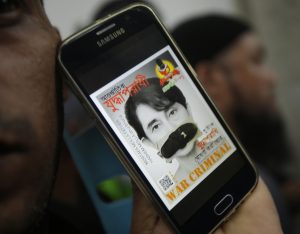Communication technologies have been a digital lifeline for the Rohingya diaspora to deliver a single and cohesive narrative that articulates their demand for justice and citizenship rights in transnational spaces. Equipped with digital skills, they are determined to raise their voice against the genocidal regime.
Many studies show how digital diaspora maintain transnational activities that shape the ethnic identity and the daily experiences of migration in the host country. In the case of the Rohingyas, recently, more than 100 social media activists from the global Rohingya diaspora took part in a demonstration in front of the International Court of Justice (ICJ) in The Hague. They also raised their voice on social media platforms using the hashtag #StopRohingyaGenocide. This digital outreach has had a tremendous impact,
Over the past two decades, Rohingya diaspora members have campaigned tirelessly for recognition of their sufferings and rights. In particular, activists have been urging international human rights agencies, including the United Nations, to endorse the findings of the Independent International Fact-Finding Mission (IIFFMM) report that found the Rohingyas “remain at serious risk of genocide.”
Finally, on January 23, the ICJ ordered provisional measures to prevent the genocide of Rohingya Muslims in Myanmar in the first ruling related to The Gambia v. Myanmar, a case filed in November 2019 that seeks to enforce the UN 1948 Genocide Convention. The decision comes after de facto leader Aung San Suu Kyi defended her country against the allegations in person in December. Such a historic decision from the ICJ makes the voice of Rohingya Muslims heard after longstanding persecution – and gave the Rohingya community something to smile about for the first time in years. Thousands of members of the Rohingya diaspora living in the camps of Bangladesh expressed their gratitude to the ICJ and The Gambia. Although the Rohingyas lack a nation-state and official recognition, the ICJ case unites them all together.
However, Myanmar has neither shown any progress on letting the Rohingyas return safely nor seems keen to undertake any initiative recognizing them as legal residents and citizens. The denial of citizenship and ethnic identity has been the Myanmar government’s mechanism to drive them out of the country. Rohingyas do not possess a state to call their own, and thus remain trapped between Bangladesh and Myanmar, and from there scattering all over the world.
Since the murderous campaign and crackdown in Rakhine state, Rohingya diaspora groups have been vocal in Australia, Canada, and the United States, along with the major European cities. From overseas, activists are raising awareness about torture, suffering, and the denial of their citizenship rights using digital platforms, such as YouTube-based digital platforms Rohingya Vision and The Arakan Times Rohingya News, synchronised with other social media platforms. Twitter, Facebook, and Instagram have been enormously popular among the Rohingya diaspora across the world.
Social media platforms work as a powerful instrument for displaced people to share stories of their community’s plight, reaching new audiences across the globe in ways traditional media have not. Such transnational engagements are not only related to the country of origin but also to their ethnic identity, and thus social media use shapes the daily experiences of the Rohingya diaspora in their host countries. In addition, digital technologies can also provide the diaspora with learning resources, capacity, “bonds,” and “links,” creating social capital beyond the border in order to maintain a sense of collective identity.
Members of the Rohingya diaspora in Australia are ardent about using their diasporic agency in order to resolve the crisis. The Australian Rohingya diaspora regularly organizes meetings, workshops, discussions, cultural events about the genocide in Myanmar. As a media and migration academic, I spoke with some diaspora activists based on Australia about the role the Rohingya diaspora can play in resolving the crisis. A diaspora member in Australia explained that Rohingya diaspora communities across the globe have digital savvy and extensive “digitally mediated” communication that is very crucial when engaging with transnational relations and political activism.
The Facebook pages “Rohingya Community in Australia” and “Burmese Rohingya Community in Australia” (BRCA), which has 21,000 followers, are a manifestation of the online political activism of the Rohingya digital diaspora. Recently, BRCA arranged a protest in support of The Gambia for the ICJ case. They urged the Australian government and world community to stand by the Rohingya, chanting, “Australia, take a role…Stop genocide in Myanmar, right now.” A video of the protest shared on their Facebook page has 571 shares, 19,000 views, and 190 comments.
In another example, youth members of the community in Queensland have even used Facebook to promote their new Rohingya United FC-Brisbane, a football team that defines its mission as “to play soccer and partake in recreational activities while promoting the Rohingyas’ plight and culture with the wider Australian society.”
Taking advantage of proliferating smartphones and social media platforms, the Rohingya digital diaspora is contributing toward the development of transnational political engagement and identity. Diaspora members should have more digital skills and resources so that they could leverage their transnational engagement in the digital age.
Abdul Aziz is a Ph.D. candidate at School of Communication and affiliated with the Digital Media Research Centre (DMRC) of Queensland University of Technology (QUT) in Australia. His research focuses on cultures and practices of everyday digital technology use with particular emphasis on identity and integration of diaspora.

































